For Centuries, humans have continually adjusted and tailored dietary guidelines to align with the latest trends, science, and research. The current fad of excluding grains, carbs, and processed foods from human diets has extended to pet foods, with grain-free options gaining popularity. However, the decision is more complex when it comes to whether Great Danes should have grain free food or not.
You may have heard from your veterinarian, a friend, or on social media that grain-free or boutique (“BEG”) foods are bad for Great Danes. Alternatively, you may have heard that grain-free kibbles are “higher quality”, have “more meat”, and can help resolve allergies.
It’s hard to know what to do when you hear so many conflicting opinions, so here at Hello Danes we’re going to run with science.
In the interest of saving you some time here, I will cut to the chase. Of course, we’re going to deep dive into this below, but here is the low down: most, if not all, grain-free kibbles are a bad choice to feed your Great Dane.
The information in this blog post is important and may save your dogs life!
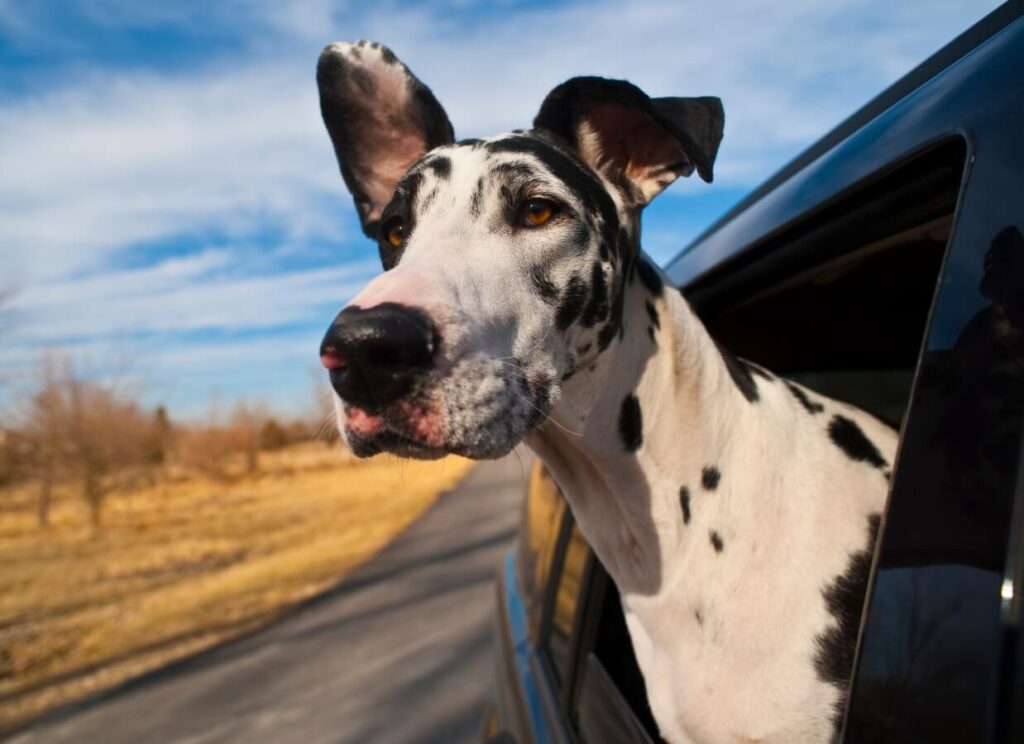
The Problem with Grain-Free Dog Food
All extruded kibbles require some kind of starch to bind the meat together. Without it, the food would be dust.
In grain-inclusive dog foods, this starch is often some form of rice or oats.
In grain-free dog foods, grains are replaced most often with ingredients such as peas, lentils, and potatoes. These are starchy carbohydrates that may also be used to replace meat-based protein.
(A benefit of ingredients such as rice, oats, or lentils is that they add fiber to your dog’s diet, which may decrease the risk of bloat. )
Grain-free foods are NOT carb-free! Lentils, peas, and potatoes have lots of carbohydrates.
Now it’s also important to understand that ‘Fresh meat’ is roughly 70% water and doesn’t have the same robust nutritional profile that bone, organ meat, and cartilage has.
Compare that to a concentrated meat meal or meat by-product meal (which sounds gross, but is made of bone, organ, tissue, and cartilage), and is packed with protein and amino acids. Meat meals are only 10% water.
Many grain-free kibbles after extrusion, especially those with ‘fresh meat’ and multiple starch sources, are nothing more than meat-flavored peas or lentils.
Even if you personally see no correlation between grain-free dog food and DCM (more on this below), you have to admit this is a huge problem.

What is DCM in Dogs?
Now for the fun part.
Grain-free and improperly balanced or pulse (legume) heavy boutique brand foods are implicated in a notable increase of deadly DCM (heart problems) in pet dogs.
By implicated, we mean that there is a strong correlation that is actively being studied. Check out any veterinary or breed-specific group and you will see stories of dogs dying this way. Lots of them.
DCM (aka ‘Dilated Cardiomyopathy) is a devastating disease that results in an enlarged heart. The larger heart has to work harder to pump blood and as a result, the valves can leak.
Over time, the heart cannot keep up.
Fluid builds up in the chest and abdomen and eventually, the heart will give out.
Left untreated, many dogs eventually suffer from congestive heart failure and will die, often suddenly.
Unfortunately, DCM is often a ‘silent killer’, often undetected until it is too late.
Great Danes are genetically prone to DCM (deadly heart problems), especially if the breeder isn’t fully health-testing the parents. So their risk of developing DCM is even higher than it is for other dogs.
Many people have what they think are ‘perfectly healthy’ young Great Danes with shiny coats and perfect stools. These dogs die suddenly while sleeping or playing.
Some of them have genetic DCM.
Many of them have secondary DCM, however. This is caused by unbalanced, poorly formulated food and nutrient deficiency.
Read on…
A Tasty Top: The Top 11 Foods to Feed a Great Dane
Great Dane Not Eating- What to Do

Signs of DCM Heart Disease in Dogs
DCM often presents with no symptoms, especially secondary DCM.
Secondary DCM is seen in dogs who are fed incorrect and unbalanced nutrition.
An echocardiogram is needed to diagnose DCM/Dilated Cardiomyopathy.
To be clear, a regular ‘vet check’ does not rule out nutrition and diet-related heart problems.
If you are feeding a boutique or grain-free diet, it is recommended that you get an echocardiogram for your dog.
Symptoms of more advanced stage DCM in dogs include:
- Coughing
- Lethargy
- Anorexia
- Labored Breathing
- Rapid breathing when resting or sleeping
- Distended belly
- Weight loss
- Depression
- Lowered activity
- Sudden death
https://vcahospitals.com/know-your-pet/dilated-cardiomyopathy-dcm-in-dogs–indepth
How is DCM Treated?
Once a dog is diagnosed with primary (genetic) or secondary (nutrition-related) DCM, or the early signs of it, things must happen quickly.
The veterinarian will typically:
- Recommend that the diet is immediately changed to food that meets WSAVA guidelines
- Prescribe medications and supplements if needed
- Encourage certain restrictions to exercise
- Give you a list of signs and symptoms to watch for that indicate worsening Dilated Cardiomyopathy or congestive heart failure
4-6 months later, the dog will be checked again via echocardiogram.
For dogs with primary DCM (genetic), the condition may not improve.
With secondary DCM (nutrition-based), assuming that the condition was caught soon enough and the dog was switched to a properly formulated science-backed food, improvement is often noted. Some dogs go on to live full, normal lives.
Great Dane Nutrition: Puppy vs. Adult Food
How do I Fix my Dog’s Upset Stomach?
Our List of the Best Foods for Great Danes, 2022
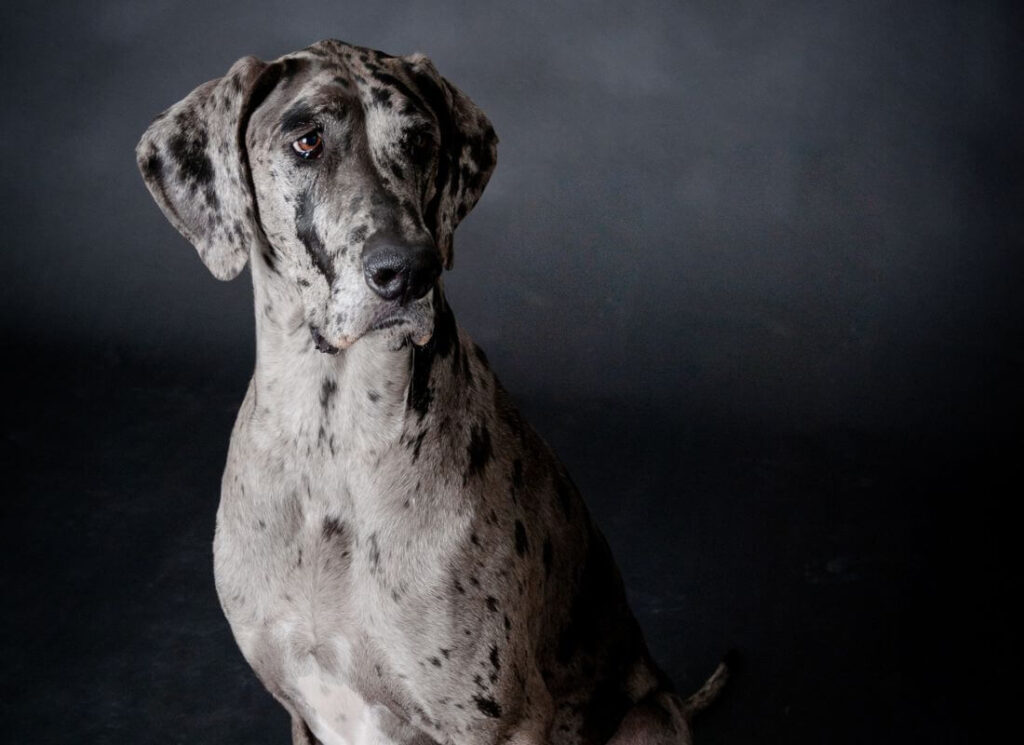
Why do vets not recommend grain-free food?
A large majority of food-related DCM cases go undocumented.
Many dogs pass suddenly of a ‘heart attack’, during anesthesia, or in their sleep. Expensive (and often heartbreaking) post-mortem testing for it isn’t always done.
Great Danes do have a genetic predisposition to primary DCM that may be at play here.
This makes it even more important to be informed about the roll that diet may play, and to ensure that all breeders are thoroughly testing their dogs (OFA Heart / Echocardiograms, etc.) prior to breeding.
If you feed grain-free, are thinking about feeding grain-free OR are ‘on the fence’ about this debate, read on.
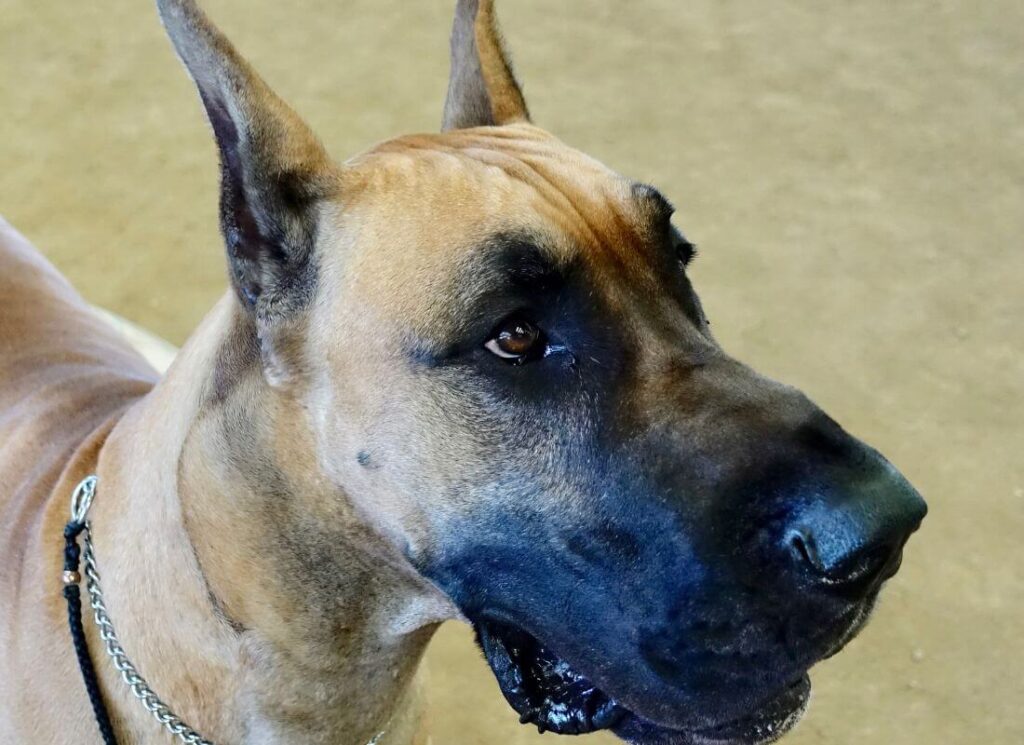
Should Great Danes eat Grain-Free food?
The potential link between grain-free foods and DCM was brought to the attention of the FDA when Veterinary Cardiologists were noticing an increase of suspicious heart problems in dogs.
Secondary DCM was showing up at an alarming rate; higher than the typical genetic incidence, and they were growing concerned.
Their investigation revealed (and still reveals to date) that an alarming majority (90%) of the dogs experiencing secondary DCM were being fed boutique dog foods.
Kibbles from small dog food companies such as Fromm’s, Orijen, Diamond, Victor, Nutrisource, 4Health, and Acana are taking the brunt of this potential correlation, primarily because among ’boutique’ and smaller food brands they have the largest market share.
More fed dogs = more sick dogs.
But there are 1000’s of brands and formulas on the market. Not being on that list doesn’t magically make a diet “safe”, and consider this:
Purina, Royal Canin and Hill’s feed more dogs than any other brands. Purina alone leads the market with over 16 billion in revenue (2021, and growing).
That’s a lot of dogs. Many more than are fed Fromm, Victor, or otherwise and yet…the millions of Purina-fed dogs are not turning up with nutritional-DCM.
The fact that any are turning up at all in smaller brands is alarming.
Since the time of the original DCM reports, the grain-free DCM debate has become a hotbed of opinions, frustration, and concern between professionals, credentialed nutritionists, raw feeding enthusiasts, and dog owners.
At Hello Danes, we believe that a grain-free food from a small company, that has a lot of peas, lentils, legumes, or potatoes in the ingredients list is dangerous to feed.
People don’t want to hear that the food they believed to be ‘holistic’ and ‘high quality’ may actually be killing their beloved pet. It’s easy to want to believe that something more ‘natural’ is best, but it’s not always the case, unfortunately.
DCM Groups to Join on Facebook:
The following groups have tons of information from real dog owners and veterinarians:
Pet Vet Corner: https://www.facebook.com/groups/337421456457048
Canine: Nutrition and Dog Food Discussion: https://www.facebook.com/groups/551782614843296
Diet Associated DCM in Dogs: https://www.facebook.com/groups/1952593284998859

Does adding taurine to Grain-Free food prevent DCM?
In response to the FDA warnings about DCM and grain-free dog food, people began to believe that adding taurine or grains to a dog’s diet would solve the problem.
This concept doesn’t actually have science to back it up; it was only a theory that as of this writing still has no merit.
Regardless, many boutique manufacturers responded by adding taurine to their formulation. They then took the opportunity to market their brand as being ‘scientific and thoughtful’.
Of the DCM cases being studied by the FDA, many of the dogs suffering from DCM had normal taurine levels.
If there is any merit or science behind a taurine-DCM link, current research is indicating that it’s likely related to formulation problems in the food that may be blocking the synthesis and bioavailability of taurine.
In other words; adding taurine isn’t likely to solve a problem that originated with a poorly-formulated diet to begin with.
You can’t supplement your way out of a bad diet.
Dr. Jennifer Larson, Veterinary Nutritionist U.C. Davis
Does adding grains to dog food prevent DCM?
Adding grains (such as rice or oats) at home to a grain-free kibble only serves to further unbalance the food and load the dog up on carbs.
This too has been done with no scientific backing. Doing so is not safe, effective or healthy.
Do not add rice, millet, oats, or other grains to your Danes boutique diet to ‘prevent DCM’. There is no science behind that theory at all, and it may do more harm than good.
Additionally, choosing the ‘grain-inclusive’ version of a boutique dog food brand does not make it magically ‘safe’.
Nutritional DCM has been seen in dogs on boutique diets of all kinds, both grain-inclusive and grain-free.
Read here about how my own Great Dane Matilda nearly died from nutritional imbalance related to a boutique ‘holistic’ dog food.
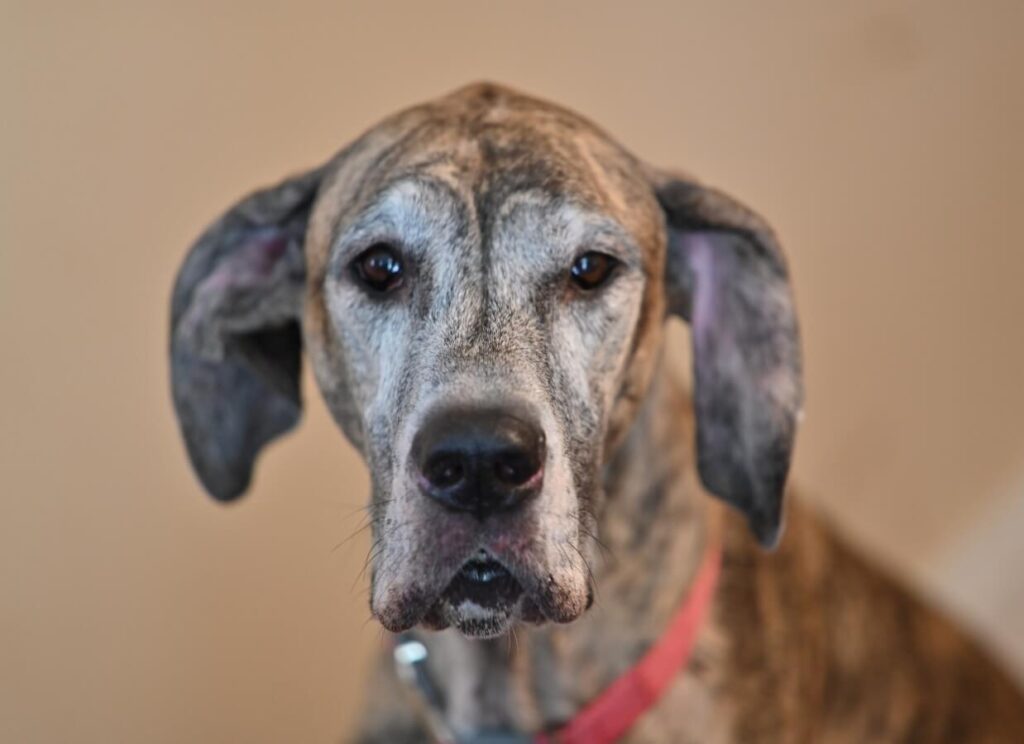
Is a Grain-Free Diet ok for dogs?
While ‘grain-free’ foods and boutique brands specifically have been implicated, it is believed that the problem may actually originate with boutique kibbles that are formulated with a lot of pulse, legumes, peas and potatoes.
Remember, many Grain-free kibbles heavily utilize peas, pulses, lentils, garbanzo beans and potatoes in their formulation.
In other words, just as the FDA stated (see below) that it’s not necessarily grain-free that is the problem, it’s boutique foods that are:
- Heavy in pulses, peas, potatoes, and legumes
- Not formulated by an on-staff board-certified Veterinary Nutritionist
- Manufactured by brands that don’t participate in peer-reviewed science, research and feeding trials
Many of these types of diets tend to be grain-free.
So can Great Danes have grain-free foods? Sure, but should they? Probably NOT.
When you read something that says ‘the FDA finds no evidence that grain-free diets cause heart disease‘, don’t immediately jump to the conclusion that your ‘grain-free boutique kibble’ is safe.
Read that statement for what it is. It’s not the lack of grains that is the problem.
It’s the replacement of essential meat-based amino acids and proteins with pulses, peas, potatoes, legumes, and other plant-based carbohydrates, often done by boutique brands with no board-certified veterinary nutritionist on staff to formulate, research and test the food.
Research is ongoing and all of us should be alarmed, not defensive.
Read the Label on your Dog Food Bag
Read the ingredients list on the back of your grain-free kibble, ‘fresh’ or ‘human-grade’ dog food bag. Do you notice a lot of the following? It may be worth changing your dog’s diet as a precaution, especially if you noticed multiple forms of the same ingredient (aka, Ingredient Splitting).
- Peas, Pea protein, Pea Starch, Pea Fiber, Pea Flour
- Potatoes, Potato Protein, Potato Starch, Potato Fiber, Potato Flour
- Sweet Potatoes
- Lentils, Green Lentils, Red Lentils, Dried Lentils, Fresh Lentils, Whole Lentils
- Garbanzo Beans, Chickpeas, Chickpea Flour, Chickpea Fiber
- Other similar non-grain ingredients including pulses and legumes
We also recommend avoiding the following dog food brands altogether (this list is not exhaustive).
Despite making up only a small market share of dog food sold, these brands (and brands like them) are responsible for 100% of nutrition-related DCM cases (and likely many, many more health conditions including chronic loose stools, itching, hyper or hypocalcemia, growth disorders and more):
- Fromm
- Victor
- 4Health
- Diamond Naturals
- Costco
- Nulo
- Nutro
- Nutrisource
- Earthborn Holistic
- Acana
- Orijen
- Zignature
- Solid Gold
As pet owners, we don’t have enough professional knowledge to evaluate ingredients list pros and cons.
Here is a great article on why judging food by the ingredients list is an amateur mistake!
We tend to default to what ‘feels right’ or ‘seems healthy’, especially when boutique food companies use catchy, unregulated words such as ‘holistic’ and ‘super-premium’.

What are ’boutique dog food diets’?
Boutique food diets for dogs come from small companies that use catchy terms in their marketing.
New research (in 2022) indicates that the DCM and Grain-Free foods issue correlates STRONGLY to boutique food brands where no board-certified veterinary nutritionist is on staff to formulate the foods.
Hallmark traits of boutique dog food diets:
- Offers very little if any contribution to canine nutrition, health and veterinary research
- Does not support veterinary nutrition, health and research organizations (such as WSAVA)
- Does not participate in full, legitimate AAFCO feeding trials to prove formulations
- Only formulates their food to ‘meet the nutritional requirements’ on paper
- Does not employ a board-certified Veterinary Nutritionist to formulate the food; may ‘contract’ with a professional that has lesser degrees
- May or may not own and operate their own manufacturing facilities
- May use ‘exotic’ ingredients with very little research behind them, including kangaroo, bison and unusual carbohydrates such as millet.
https://www.docofalltrades.net/2022/04/randomized-feeding-trial-in-labradors
Here are some catchy terms meant to make you feel ‘good’ about the food:
- Holistic
- Human Grade
- Added Taurine
- All Natural
- Guaranteed Health
- Family-owned
- Super-Premium
- ‘No Recalls’
- ‘No Fillers’
- ‘Fresh’
- ‘Ancient Grains’
Here is a great article about boutique dog foods from the Burlington Vet Center: https://burlingtonvetctr.com/boutique-exotic-and-grain-free-pet-foods-and-their-link-to-heart-disease
Boutique dog foods
The following brands are just some of the popular boutique dog foods. Check these brands against the manufacturer report above and see how they rate.
- Victor
- Nulo
- Diamond
- Costco/Kirkland
- Fromm
- Nutro
- 4 Health
- Roosevelt
- Life’s Abundance
- Nutrisource
- Olly
- The Farmer’s Dog
- Earthborn Holistic
- Ketona
- Spot and Tango
The problem with boutique dog food marketing
When you start looking into it, you may be surprised to find that MANY boutique kibble brands do not employ a legitimate, board-certified veterinary nutritionist to formulate, research, test and update their foods.
As a matter of fact, a lot of ‘natural’ kibble brands only appear healthier because of their impressive dedication to packaging and marketing.
FROMM, for example, is a brand that has been implicated many times in DCM. There have been many Fromm-related cases where dogs had their secondary DCM symptoms reversed by switching to a more professionally formulated diet.
FROMM family foods are formulated by a chemical engineer; not somebody with a credible background in actual nutrition and current research. But their marketing makes you belief in their ‘family owned’ mission of ‘healthy’ nutrition.
There are more dogs, more dogs eating kibble and more veterinary resources at our disposal now; so it stands to reason that this has always been a problem, but we are just now starting to really see it.
DCM is often a silent killer. MANY dogs will die suddenly of a ‘heart attack’ without warning. In this case, owners rarely seek answers (a post-mortem autopsy is expensive) and as a result, DCM is never diagnosed or tied to the food that had been fed.

Is the Dog Food Advisor Blog a good place to learn about dog food?
Many people reference the dog food advisor blog for nutrition information for their pets.
The owner of that blog is a human dentist with no background in veterinary nutrition.
The rating system is made up.
We can do so much better than this when choosing large breed dry dog food for our beloved dogs, right?
What is the best dog food for Great Danes 2021-2022?
After much research into this ourselves, we believe that if you are going to feed kibble you should choose a brand that is fully backed by top-level research and veterinary nutritionists.
The best dry food for Great Dane dogs is going to be backed by research and science, not opinions and marketing.
When choosing a dry dog food diet for your Great Dane, of course, you will want to choose something that you feel good feeding!
Look past the ingredients list and research the company itself.
- Do they employ a dedicated, on-staff board certified veterinary nutritionist (ACVN or DACVN)?
- Do they manufacture the food in-house, from carefully sourced, chosen, and tested ingredients?
- Do they participate in university-level research and nutrition study for the advancement of companion animal health?
- Do their foods undergo AAFCO feeding trials, or are they just formulated to meet minimums on paper?
- Do they support the non-profit World Small Animal Veterinary Association (WSAVA) or give you reasons why they don’t?
Marketing has unfortunately taught us that the heavily researched, professionally formulated science-backed dog food brands such as Purina, Royal Canin, and Eukanuba are ‘full of fillers and cancer-causing junk‘. ,
That couldn’t be farther from the truth.
Take note of the people you tend to hear that kind of misinformation from; none of them have any credible, boarded, science-backed veterinary background in canine nutrition. None. Most stand to gain, financially, from making you believe these things, too. Follow the money!
Millions of dollars of actual health and nutrition-based research are done by the ‘Big 5’ brands, who use that information to formulate and then fully test the foods that they sell.
Millions of dogs are eating these brands every single day and living long, healthy lives too! As a matter of fact, Pro Plan and Royal Canin are the foods of choice for a large majority of top breeders and dog sports competitors, not to mention veterinarians and millions of dog owners.
We recommend Purina Pro Plan, however, a large or giant breed formula (puppy or adult, depending on your dog) from any of the following brands is an acceptable choice: Purina, Eukanuba, Iams, Hills, Royal Canin.
The best dog foods for Great Danes:
- Purina Pro Plan Large Breed Puppy – any flavor!
- Purina Pro Plan Sensitive Skin & Stomach Large Breed puppy – TOP PICK, salmon-based
- Eukanuba Large Breed Puppy (Great for active and sporting dogs)
- Purina One Large Breed Puppy (Excellent budget option)
- Hill’s Science Diet Puppy Large Breed
- Royal Canin Giant Puppy Dry Dog food (to age 12 months) – TOP PICK, PREMIUM OPTION
- Royal Canin Giant Junior Dry Dog food (8-24 months)
- Purina Large Breed Puppy Chow
Check out THE GIANT DOG FOOD PROJECT to compare brands and values.
- Purina Pro Plan Sensitive Skin and Stomach Large Breed (Salmon based, chicken free)
- Purina Pro Plan Large Breed Shredded Chicken & Rice (Large Pieces & Chicken Shreds!)
- Purina Pro Plan Large Breed Weight Management (Get the weight off)
- Purina Pro Plan Large Breed Bright Mind Age 7+ (for Senior Great Danes)
- Purina Pro Plan Giant Breed (Hard to find, might be discontinued)
- Royal Canin Giant Breed (Amazing for dogs with chronic loose stools, TOP TIER)
- Eukanuba Large Breed (Great for active and sport dogs)
- Purina One Smart Blend Large Breed (Fantastic budget-friendly option)
- Hill’s Science Diet Large Breed Beef & Rice
- Purina Pro Plan 30/20 Sport Beef & Bison
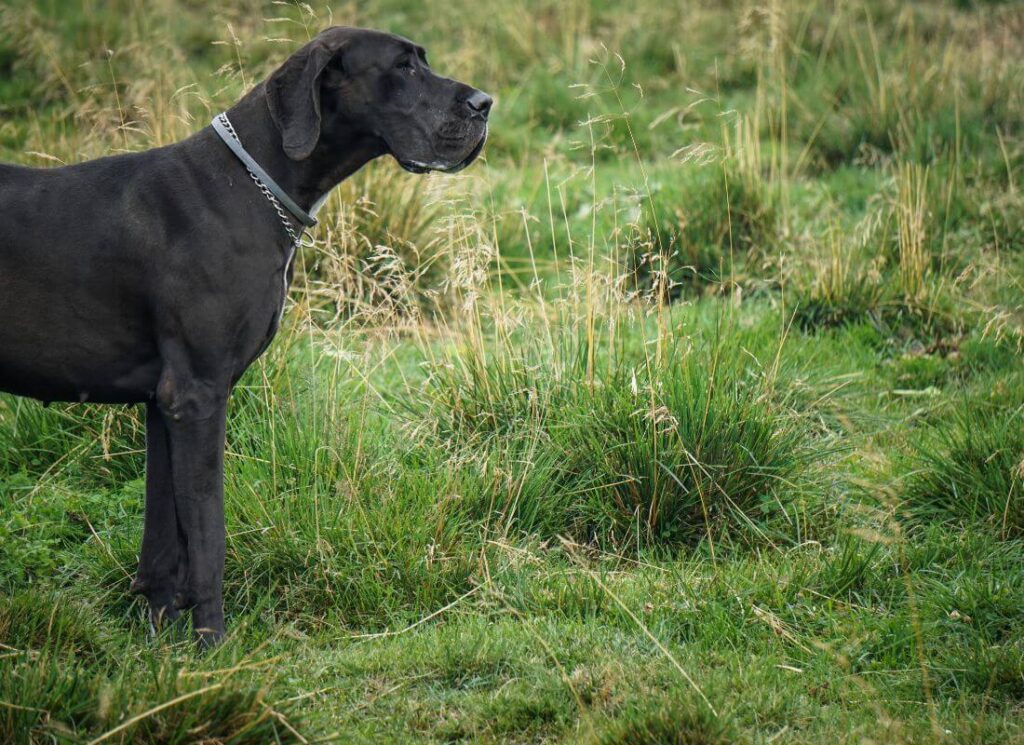
Vet recommended dog food for Great Danes
The majority of veterinarians in the U.S. are going to recommend one of the following brands of food:
- Purina
- Royal Canin
- Eukanuba
- Iams
- Hill’s Science Diet
Some people will argue that veterinarians have very little nutrition education and that their education comes from companies that incentivize them to take the class and promote their food.
Then it is believed that the veterinarians stand to profit from the sale of foods in their office and are making tons of money marketing these ‘billion-dollar cancer nuggets’.
Let’s dig deeper into that!
a. The companies sponsoring nutrition classes at the top veterinary schools are the same companies that spend millions on nutrition research and canine health science. They know a lot more about canine nutrition than boutique food brands, so if our vets are going to learn about nutrition, it should probably be from them right?
b. A veterinarian that has taken a few nutrition classes during the course of their study has still learned a lot more about canine nutrition than somebody who sells pet food at a boutique pet store. For some reason, people are more willing to listen to a sales rep with 7 days of training or a dog trainer than to somebody with a studied, professional veterinary background!
c. Some veterinarians go on to obtain additional certifications in canine nutrition. Every single one of these highly-studied veterinarians will still recommend the science-backed and heavily researched food brands listed above and no, they often don’t make a dime on those recommendations. Kickbacks are actually ILLEGAL in the U.S.
d. Veterinarians are often approached by companies to market food brands and make brand recommendations. There is a reason we don’t see veterinarians promoting boutique brands for affiliate income (even though they totally could); they simply don’t believe in those foods.
e. If a veterinarian profits from the sale of science-backed, professionally formulated dog food, why is that so bad? The boutique pet store profits too from selling you ‘healthy and holistic’ pet food diets made by companies with no nutrition research backing their food.
There are plenty of opportunities for veterinarians to use affiliate links to promote ’boutique’ food brands. They don’t, though. Ever think about why that is?
You’ll notice that we use affiliate links in our promotion of certain food brands. We could choose any brand to promote!
Do we make a few pennies if you purchase through our affiliate link? Sure. Anytime you buy food, somebody will profit no matter what.
Question if the people you are listening to are promoting that food because it’s backed by actual science, or because it’s backed by opinion and boutique marketing.
The truth here is that boutique food brands earn millions by using marketing, fancy words, and pretty packaging to make you believe that the unproven, untested food they make is healthier.
The food-profit incentive is not isolated to veterinarians who make pennies on the sale of a bag of food. Stop blaming that. Everybody profits somewhere. Put your money where the science is.
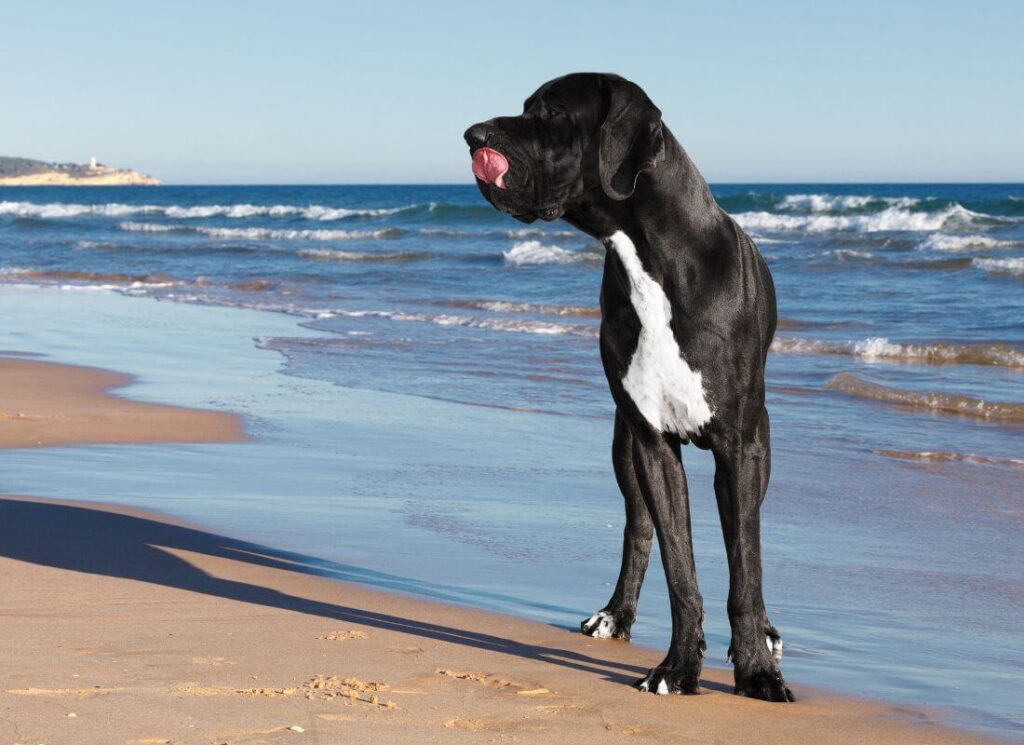
Homemade dog food for Great Danes
Regarding Home Cooked Diets:
Pinterest and a crock pot full of overcooked meat, veggies and rice is NOT balanced nor is it magically healthier for your pet.
If you are planning to home cook meals for your dog, work with a credentialed, studied veterinary nutritionist to develop a recipe specifically for your pet.
You can search for a veterinary nutritionist HERE: https://acvn.org/directory/
You may hear from dog trainers or ‘holistic’ pet care professionals that cooking food at home is the healthiest choice, however these people don’t have expertise in canine nutrition.
Below we’ve linked our favorite resources for learning more about homemade feeding.
HOME COOKED FEEDING RESOURCES
Note that anybody can pick up the ‘nutritionist’ title. Being a dog or ‘nutrition’ enthusiast, or working in a pet store as a brand rep or salesperson does not make somebody an expert.
Look for University level degrees & certifications in canine nutrition, not non-degree ‘certifications’ from small unaffiliated organizations.
- Purina Pro Plan Sensitive Skin and Stomach Large Breed (Salmon based, chicken free)
- Purina Pro Plan Large Breed Shredded Chicken & Rice (Large Pieces & Chicken Shreds!)
- Purina Pro Plan Large Breed Weight Management (Get the weight off)
- Purina Pro Plan Large Breed Bright Mind Age 7+ (for Senior Great Danes)
- Purina Pro Plan Giant Breed (Hard to find, might be discontinued)
- Royal Canin Giant Breed (Amazing for dogs with chronic loose stools, TOP TIER)
- Eukanuba Large Breed (Great for active and sport dogs)
- Purina One Smart Blend Large Breed (Fantastic budget-friendly option)
- Hill’s Science Diet Large Breed Beef & Rice
- Purina Pro Plan 30/20 Sport Beef & Bison
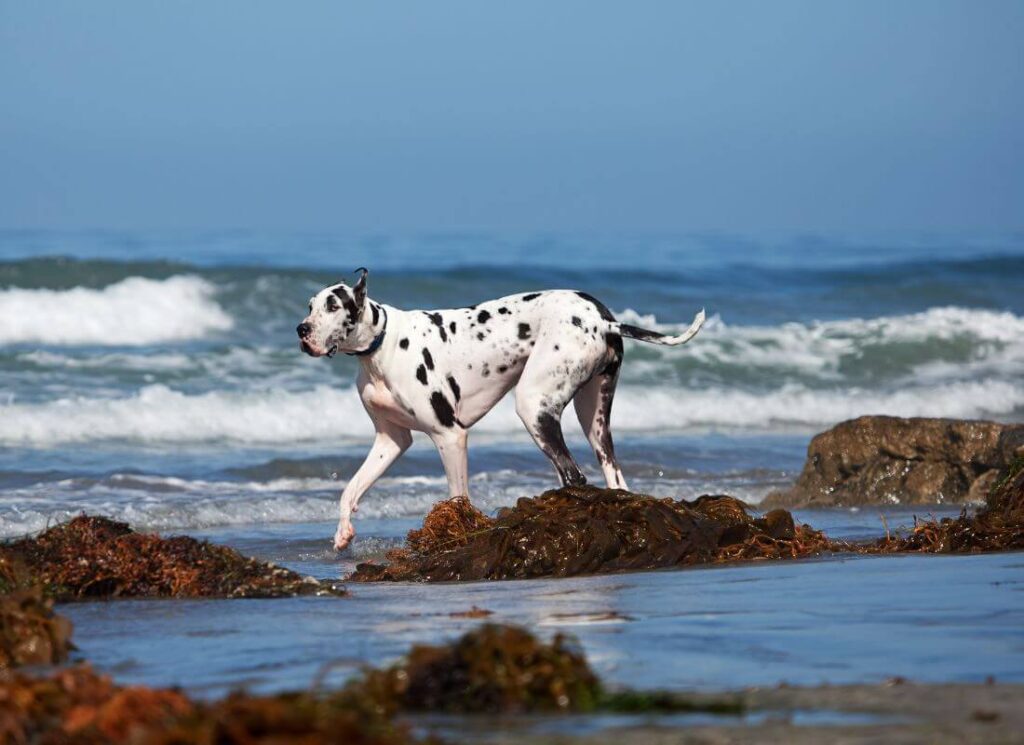
OUR RECOMMENDATIONS FOR GREAT DANES
Science does show us that adding fresh foods to our Danes diet may help reduce the risk of bloat.
An appropriate Great Dane kibble offers meat meals in the first ingredients and offers appropriate protein and calcium/phosphorus ratios for the life stage of the dog.
Examples of fresh-food toppers that can be used for up to 10% of the total diet include:
- Hydrated Dr. Harvey’s (one scoop)
- Rehydrated Olewo Carrots (great for dogs that suffer from chronic loose stools)
- Rehydrated Olewo Beets
- Fresh fruits such as blueberries, bananas or apples
- Fresh veggies such as carrots, zucchini, cauliflower and even lettuce (a head of lettuce makes a great enrichment activity! Dogs love to shred them)
- Unsalted sardines packed in water or frozen/whole
- Unsalted bone broth (make it at home!)
The following foods for Great Danes are heavily researched, backed by legitimate nutrition science, and are fed to millions of robust, healthy dogs worldwide.
For Puppies:
- Purina Pro Plan Large Breed Puppy – any flavor!
- Purina Pro Plan Sensitive Skin & Stomach Large Breed puppy – TOP PICK, salmon-based
- Eukanuba Large Breed Puppy (Great for active and sporting dogs)
- Purina One Large Breed Puppy (Excellent budget option)
- Hill’s Science Diet Puppy Large Breed
- Royal Canin Giant Puppy Dry Dog food (to age 12 months) – TOP PICK, PREMIUM OPTION
- Royal Canin Giant Junior Dry Dog food (8-24 months)
- Purina Large Breed Puppy Chow
Check out THE GIANT DOG FOOD PROJECT to compare brands and values.
For Adults:
- Purina Pro Plan Sensitive Skin and Stomach Large Breed (Salmon based, chicken free)
- Purina Pro Plan Large Breed Shredded Chicken & Rice (Large Pieces & Chicken Shreds!)
- Purina Pro Plan Large Breed Weight Management (Get the weight off)
- Purina Pro Plan Large Breed Bright Mind Age 7+ (for Senior Great Danes)
- Purina Pro Plan Giant Breed (Hard to find, might be discontinued)
- Royal Canin Giant Breed (Amazing for dogs with chronic loose stools, TOP TIER)
- Eukanuba Large Breed (Great for active and sport dogs)
- Purina One Smart Blend Large Breed (Fantastic budget-friendly option)
- Hill’s Science Diet Large Breed Beef & Rice
- Purina Pro Plan 30/20 Sport Beef & Bison
How to choose a kibble for a Great Dane Dog
When choosing a kibble, you should ideally choose a company that follows the guidelines recommended by the non-profit World Small Animal Veterinary Association (WSAVA) regarding manufacturer standards.
These are nothing more than recommendations and the WSAVA does not ‘certify’, ‘approve’ or profit directly from the sale of brands that meet these standards. If you are unsure whether your kibble is meeting these guidelines, call the company and ask them directly to answer these questions without giving you the run-around:
- The company should fully employ at least one dedicated nutritionist with a Ph.D in nutrition or a veterinarian boarded in nutrition (DACVN). If they simply consult with these professionals in lieu of employing them, they don’t likely have complete oversight of the formulation, formula changes or otherwise.
- All formulas should be formulated by the above person; somebody who is truly qualified to create foods that are balanced not only nutritionally, but functionally as well. Being a general practice veterinarian, pet expert, dog lover or having a background working in ‘pet nutrition’ isn’t necessarily a qualification that meets this recommendation.
- All diets should undergo extensive feeding trials and then meet or exceed AAFCO standards. Foods should exceed these standards both in formulation and following a rigorous analysis. Meeting these guidelines ‘on paper’ by formulation or anecdotal evidence only is not enough.
- The company/manufacturer should own and operate their own facilities and laboratories and thus, maintain full oversight and control of the production process including control and diligent monitoring.
- They should be transparent and open about their testing, process and recall history. (Note that recalls are a positive sign that a company is making ethical choices; not a sign of poor quality control. A company with no recalls is actually a red flag.)
- The company should be involved in transparent and rigorous peer-reviewed and published testing and research. Ideally, this dedication to nutrition would not just be of their foods, but of canine nutrition in general. This is especially true if they make health claims or create unusual formulations that are outside of the industry standards. Claiming to have a ‘proprietary’ formula is a red flag.
Having ‘no recalls’ is a RED FLAG
If a company is relying on the ‘no recalls’ tactic for marketing purposes, they are unlikely to recall a food for minor reasons; reasons that could ultimately be devastating for a percentage of dogs fed that food.
Recalls show that a company is diligent about avoiding mistakes and willing to hold itself accountable for problems with formulation or its supply chain. Be worried when a company says they have had ‘no recalls.
Secondary (nutrition-related) DCM is not being seen in foods formulated by Purina, Hills, Royal Canin, Iams or Eukanuba.

JOIN THE FOLLOWING GROUPS ON FACEBOOK
https://www.facebook.com/groups/CanineNutrition
https://www.facebook.com/groups/TaurineDCM/
ADDITIONAL DCM & GRAIN FREE RESOURCES AND INFORMATION
https://www.docofalltrades.net/2022/04/randomized-feeding-trial-in-labradors
READ MORE:

Leave a Reply